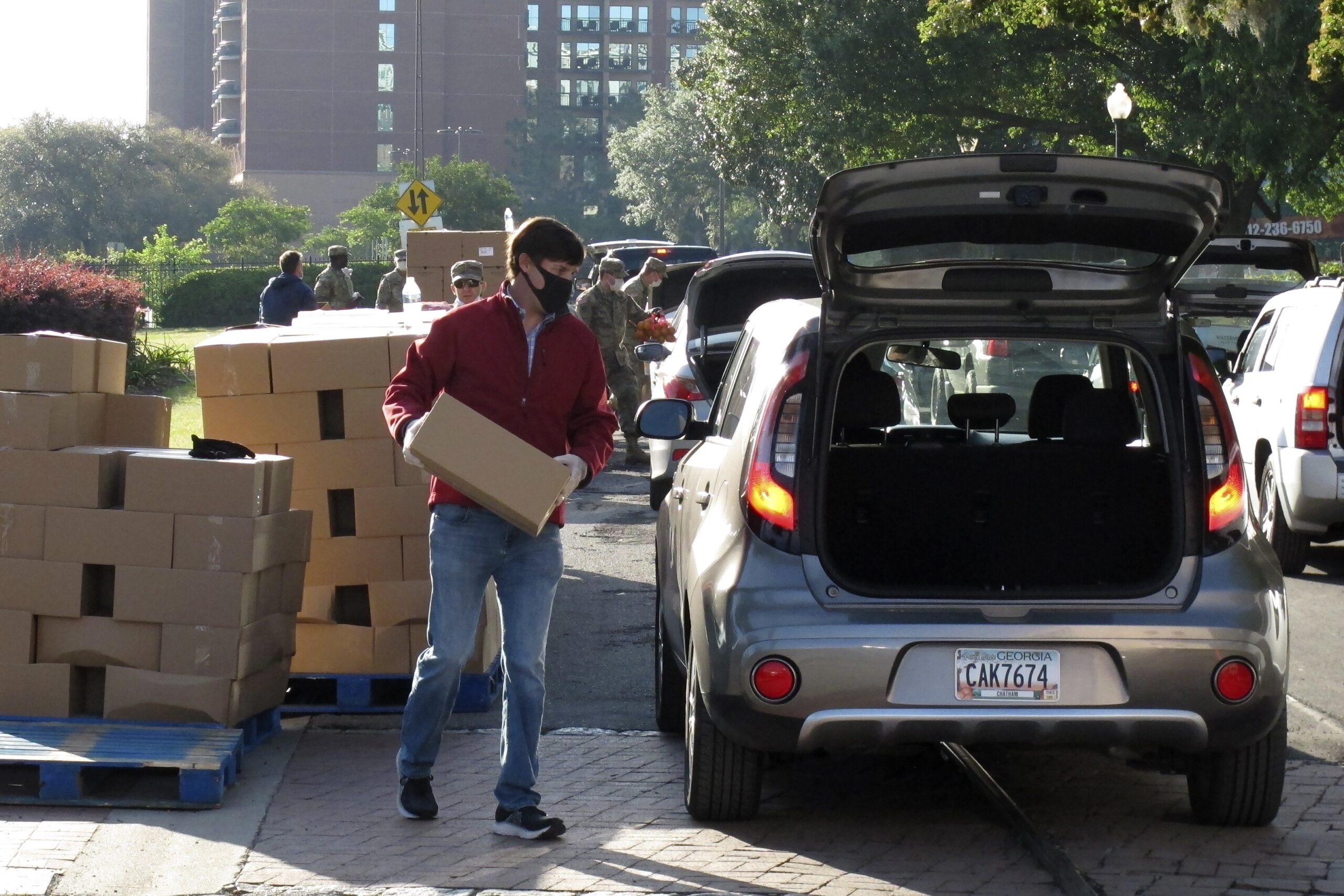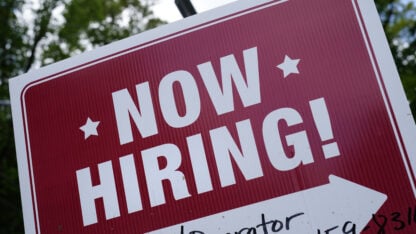Hundreds of people, including many families with kids, were lined up to get boxes of fresh vegetables and staples like oil, rice, beans and tortillas. A DJ played music for the crowd; volunteers greeted friends; local high school students had set up an art show.
“Maybe people here haven’t gone to a food bank before, but they feel comfortable coming to these because they know us, and they know there isn’t really like a stigma,” Palma said.
Los Vecinos de Buford Highway isn’t usually a food pantry. It’s a community organization. Palma said they had begun the year planning get-togethers, and encouraging people to fill out the census.
But when the pandemic hit, they started working on rental assistance and food distribution. Now, they pass out food every month, in different spots along Buford Highway. “We didn’t really plan it this way,” Palma said. “We had one in March and April, and just kept doing them.”
Lily Pabian, executive director of WeLoveBuHi, another one of the organizations behind the Buford Highway food distribution event, said people here have been especially hard hit by the slowdown in business for restaurants and hotels.
“These are communities that are frontline workers. They live pretty much paycheck to paycheck,” she said. “They don’t have the comfort of 401k, retirements, all that stuff. If they want to pay the bills, they have to work.”
Before the spread of the coronavirus, more than a million Georgians needed help getting enough food.
The pandemic is making it worse. And even with the new relief package from Congress, experts are warning that higher levels of hunger could continue here for years.
‘Unrelenting’ Increase in Need
“The food banks are responding to an unrelenting 50% increase in demand for food,” said Danah Craft, executive director of the Georgia Food Bank Association, which works with food banks around the state. “And it has grown in the last 60 days.”
About 40% of the people coming for help now have never had to look for support before, she said.
She’s especially worried about families with kids; her organization estimates one in five children in Georgia right now is experiencing food insecurity.
She said the food banks she works with are helping people sign up for government support, and supplying about 8 million more meals a month than they were, pre-pandemic. The National Guard is helping, as well, filling in the gaps left by volunteers, since many usual food bank volunteers have had to bow out, because of health concerns.
But what’s happening at the food banks – and all those images of long lines – isn’t the whole story of how the system to help hungry people works, and how that system has adapted to the pandemic.
‘The Workhorse of the Nutrition Program’
“For every meal that our network distributes, SNAP provides nine,” Craft said.
SNAP, the Supplemental Nutrition Assistance Program, is the food stamp program that gives money every month to households to buy food. Beyond just serving a lot more people, it also allows them to shop for the food they want, rather than hoping the unpredictable food pantry offerings will be something they can use.
“SNAP is really the workhorse of the nutrition program,” Craft said.
And SNAP has also expanded during the pandemic.
“We had kind of been on a decline, I guess you might say, since the height of food stamp usage during the Great Recession. Things were looking up. The economy was getting better,” said Tom Rawlings, director of the Georgia Division of Family and Children’s Services (DFCS), the state agency that manages the SNAP program.
“And then, of course, covid hit us and our numbers spiked tremendously,” he said.
The number of households getting SNAP in Georgia increased by 45% between February and September of this year.
Earlier in the year, in response to the pandemic, Congress allowed states to give some people more SNAP money per month. In the relief package passed earlier this week, SNAP recipients will get a 15% increase for six months.
DFCS has expanded its call center and is working to help fill the gap left by school meals.
Georgia is also now allowing people to use SNAP to buy groceries online.
“It’s one thing to provide benefits to individuals who need food. It’s another thing to make sure they actually are able to use those benefits,” Rawlings said.
But not everyone’s eligible for SNAP, or feels comfortable applying for it.
For instance, Gabriela Solis, who attended the food distribution event organized by WeLoveBuHi and Los Vecinos de Buford Highway.
“There’s always rumors about how it affects your immigration status,” she said. Solis is in the Deferred Action for Childhood Arrivals – or DACA – program, for people who are undocumented who came to America as young children.
Before the pandemic Solis, who has a 3-year-old son, worked at the daycare at her church. Now she disinfects the church, instead, but she gets fewer hours doing that. Her partner’s hours working construction have been cut, too. Though she also works at Freedom University, a school for undocumented students in Atlanta, she said she’s not making enough not to be worried.
“It’s hard to even focus, it’s stressful,” she said. “Especially during rent week, either you pay the rent or you buy the groceries. It’s always that. And then the holidays are coming.”
WeLoveBuHi – better known for things like collecting oral histories – plans to feed 500 families a month for a year.
Changing Tactics
Even places that were established for food aid are having to adapt to the new reality.
The Southwest Ecumenical Emergency Assistance Center, or SWEEAC, is a bustling, mostly volunteer operation in the basement of West Hunter Street Baptist Church, the church that was led by Reverend Dr. Ralph David Abernathy during the Civil Rights Movement.
SWEEAC has been around for more than 30 years, distributing food from the Atlanta Community Food Bank to more than 250 households, mostly in West End.
Before the coronavirus, people could come down to the food pantry and pick what they wanted.
“We knew immediately that was not going to work,” said Ernesta Ingram, SWEEAC’s executive director and only staff member.
She said most of their clients don’t have cars, so they couldn’t do the setup with people driving through. But with social distancing, people couldn’t gather in the food pantry, hugging and catching up like they usually did. Plus, MARTA routes were shut down, making it hard for bus riders to get there.
So SWEAAC switched to delivery. The City of Atlanta and the non-profits Concrete Jungle and Repair the World helped them recruit volunteers to do the driving.
On a warm-ish December afternoon, Darryl Williams came outside his home to get his weekly delivery, a box of staples and produce, plus other odds and ends like masks and household cleaner that volunteer Terri Senoff Jacobson had brought with her to share.
Williams said, aside from his ex-wife and his kids, he’s been trying to keep to himself during the pandemic because he has chronic kidney disease. He got laid off from his job detailing cars, and he doesn’t have a car of his own.
“This right here has been a blessing to me and my family, and I really appreciate it,” Williams said.
Jacobson has been delivering food to five households every week since March. She recently moved nearby after living for years in Atlanta’s northern suburbs, and said she feels like people she knows from the north side of town don’t realize what’s happening here.
“I just wanted to get involved,” she said. “I wanted to do something to help.”
The Long Haul
This would have been a challenging year for SWEEAC even without the pandemic. The storm that knocked out power all over Atlanta earlier this year left the church and the food pantry without electricity for weeks. SWEEAC lost thousands of dollars’ worth of food and had to pull off Thanksgiving in the dark.
But Ingram said she’s so happy with the food delivery approach, she’d like SWEEAC to stick with it, even once the pandemic is over.
“We’re able to provide in a better way to the families that we serve,” she said.
Rawlings, with DFCS, said there are things he hopes stay in place, too. For instance, allowing people to use SNAP to buy groceries online.
“We anticipate we’re going to continue to do everything we can to get benefits to folks without making them come to an office and without making them go out to a grocery store whenever possible,” he said.
As of early December, 15% of Georgia adults said they were in households that didn’t have enough food in the previous week, according to the Census Household Community Survey.
The heightened need to respond to hunger will last much longer than the pandemic itself, Rawlings said, because the economy won’t bounce back instantly. Nonprofits, food banks, and government agencies could see higher rates of hunger for years. “We’re in this for the long haul,” Rawlings said.
Alex Camardelle, a senior policy analyst with the Georgia Budget and Policy Institute, said the policy changes to SNAP have been helpful – as will the new relief package. But it won’t be enough.
“We need to be patient and not be stingy with benefits,” he said. “If we maintained a lot of the flexibilities that were put in place this year, then we would be ready or a lot more ready for any future crises, if they were to come,” he said.
He said with so many Georgians hungry even before the coronavirus, he hopes the state doesn’t settle for just getting back to the way it was.









